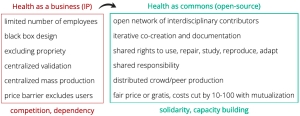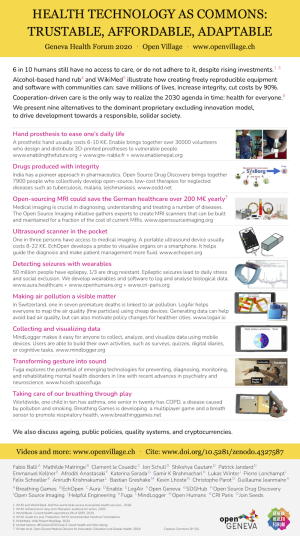GHF Open Village 2020
A series of participatory activities to value co-created, freely reproducible health knowledge and technologies (health as commons).
Initially planed during the Geneva Health Forum (March 23-26 at CICG), the event took place online (November 16-18) due to restrictions imposed.
A second, extended edition is planned in May: the GHF Open Village 2022.
Initial observation

6 in 10 humans still have no access to care,[1] or do not adhere to it,[2] despite rising investments.[3]Alcohol-based hand rub[4] and WikiMed[5] illustrate how creating freely reproducible equipment and software with communities can: save millions of lives, increase integrity, cut costs by 90%.[6]
Cooperation-driven care is the only way to realize the 2030 agenda in time: health for everyone.[7]We present alternatives to the dominant proprietary excluding innovation model, to drive development towards a responsible, solidar society.
Programme
A series of 20 sequential activities was co-created (programme). The links below provide the documentation of each activity.
Contribute to access to care
Goal: share your field experience to help us identify needs and challenges to move forward with the projects. Visual mapping, max 60 min
- Access to care: what common priorities?
- Designing fun care to foster peer support
- Adapting paramedic training in isolated areas
- Wearables for the follow-up of epilepsy
- Open-source drug
- Environmental health: fine dust sensing
- Mental health and wellbeing
- Synthesis and bridge to the current situation
- Aging healthily and innovating for disabilities
Fablab: reproducing open hardware
Goal: Discover how to conceive and reproduce hardware. 90-minute technology workshops.
- Combining spirometry and air quality sensing
- Designing ultrasound phantom simulating veins
- Exploring physiology with a connected device
- Conceiving a hand prosthesis with 3D printing
- MRI scanner and other open hardware projects
Mutualizing best practices
Goal: Leaders of open hardware projects put in common their best practices to create a guide. 90-minute discussions.
- Designing sustainable hardware and software
- Engaging a community
- Funding an open-source hardware project
- Collecting and preserving health data
- Guaranteeing the quality of material
- Open Sciences and public policies
Poster synthesis
A synthesis was released in nine languages (6 UN languages + Hindi, Bengali, Portuguese) as a poster.
- English – Health technology as commons: trustable, affordable, adaptable.
- Chinese – 公有制下的健康科技: 可信赖, 可负担, 可适应.
- Hindi – आमजन-स्वामित्व के रूप में स्वास्थ्य प्रौद्योगिकी: विश्वसनीय, अनुकूल एवं किफ़ायती.
- Spanish – La tecnología de la salud como común: confiable, asequible, adaptable.
- Arabic – تكنولوجيا الصحة ذات الملكية المشتركة : موثوقة، متاحة وقابلة للتكّيُف.
- Bengali – সর্ব সাধারনের জন্য সাস্থ্য প্রযুক্তিঃ বিশ্বাসযোগ্য,সাশ্রয়ী,অভিযোজনযোগ্য.
- French – Technologies de santé en communs : fiables, abordables, adaptables.
- Russian – Технологии здравоохранения для всех: надежные, доступные, адаптивные.
- Portuguese – A tecnologia de saúde como comuns: confiável, acessível, adaptável.
A simplified version of the English poster was published as part of the GHF poster book.
A slideshow was also realized to give an overview of the mindset.
Organisation
The GHF Open Village emerged as a joint initiative of the Geneva Health Forum, represented by its executive director Eric Comte, Open Geneva, represented by its president Thomas Maillart, and Fabio Balli, co-founder of Breathing Games.
Team
The event was co-organized by
- Fabio Balli, co-founder of Breathing Games
- Mathilde Matringue, community manager of EchOpen
- Clément le Couédic, co-founder of Aura
- Emmanuel Kellner, co-founder of LogAir
- Katerina Serada, policy analyst
- Jon Schull, founder of E-nable
The team met regularly before and after the event to define and refine its purpose and values, presented below.
Partners
Projects presented were Breathing Games, EchOpen, Aura, LogAir, E-nable, Open Humans, Open Source Imaging, Open Source Drug Discovery, and Fuga.
The activity was promoted by the Quebec Population Health Research Network and the Young European Biotech Network.
The budget for the event was covered by a Genevan association, as well as in-kind contributions from the Geneva Health Forum, Open Geneva and the Breathing Games Association. See GHF Open Village 2020 budget.
Purpose
We federate not-for-profit communities enhancing collective health, enabling individuals to better take care of their health, and build more resilient healthcare systems through co-created, freely reproducible technologies.
We lead and support a set of cooperation-driven, multidisciplinary, science-backed projects that foster solidarity and peer to peer contribution.
We strive to mutualize efforts and tools, and help shape a common-ground for like-minded projects to work together on common outcomes.
Values
For us,
- quality of cooperation prevails over competition
- mutual support prevails over technical expertise
- freedom of adaptation rather than excluding propriety
- with and by user communities rather than for them
- creation-as-research[8] rather than research after creation
Benefits
For people taking part in the GHF Open Village, we envision following benefits:
- sharing practices including open design, manufacturing of medical devices vs reproducibility, multidisciplinary community building, etc.
- mutualizing resources such as expertise of people affected, access to caregivers, health data infrastructures etc.
- developing common projects such as raising funds to test devices in various settings, hosting events to raise awareness on open health, etc.
- advocating for ‘public money, public-driven innovation’ policies in healthcare[9]
Self-assessment grid
The team also contributed to a self-assessment grid so that interested communitiey could assess their project.[10]
- ↑ WHO and World Bank. Half the world lacks access to essential health services… 2018. https://www.who.int/news/item/13-12-2017-world-bank-and-who-half-the-world-lacks-access-to-essential-health-services-100-million-still-pushed-into-extreme-poverty-because-of-health-expenses
- ↑ WHO. Adherence to long-term therapies: evidence for action. 2003. https://www.who.int/home/cms-decommissioning
- ↑ World Bank. Current health expenditure (% of GDP). 2020. https://donnees.banquemondiale.org/indicateur/SH.XPD.CHEX.GD.ZS
- ↑ WHO. Guide to Local Production: WHO-recommended Handrub Formulations. https://www.who.int/gpsc/5may/Guide_to_Local_Production.pdf
- ↑ WikiMedia. Wiki Project Med/App. 2020. https://meta.wikimedia.org/wiki/Wiki_Project_Med/App
- ↑ Winter et al. Open Source Medical Devices for Innovation, Education and Global Health. 2018. https://www.researchgate.net/publication/329072770_Open_Source_Medical_Devices_for_Innovation_Education_and_Global_Health_Case_Study_of_Open_Source_Magnetic_Resonance_Imaging_Reshaping_Business_and_Society_in_the_Era_of_Bottom-up_Economics
- ↑ United Nations. #Envision2030 Goal 3: Good Health and Well-being. https://www.un.org/development/desa/disabilities/envision2030-goal3.html
- ↑ Champman OB, Sawchuk K. Research-Creation: Intervention, Analysis and "Family Resemblances". Canadian Journal of Communication 2012; 37(1). https://cjc-online.ca/index.php/journal/article/view/2489
- ↑ Free Software Foundation Europe. Public money, public code. 2021. https://publiccode.eu
- ↑ Last page of Balli, F, Ibbotson R, Chhabra V, Pimentel JP, Suturin V, Falcon L, Timm-Bottos J, Kellner E, Menon J, Bechard N, Matringe M, le Couedic C. Open-source respiratory health commons. 15 projects communities can adapt, repair, reproduce for low cost medical care (libre and open-source tech). General meeting of the Global Alliance against chronic Respiratory Diseases 2020-2021. Zenodo 2021. https://doi.org/10.5281/zenodo.5515632
